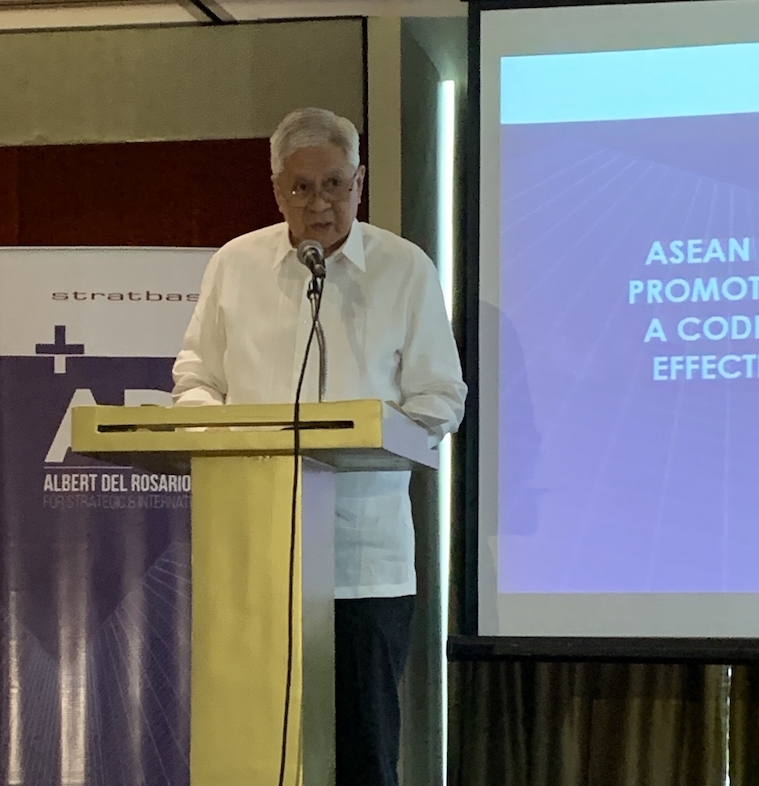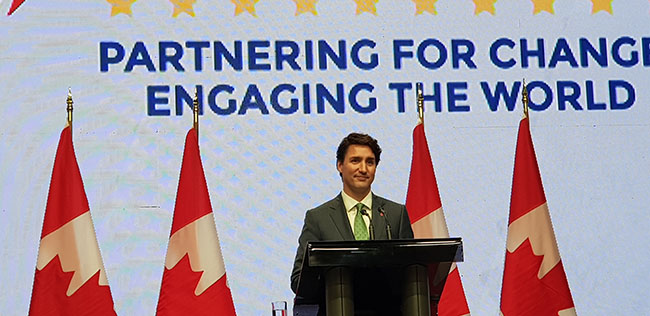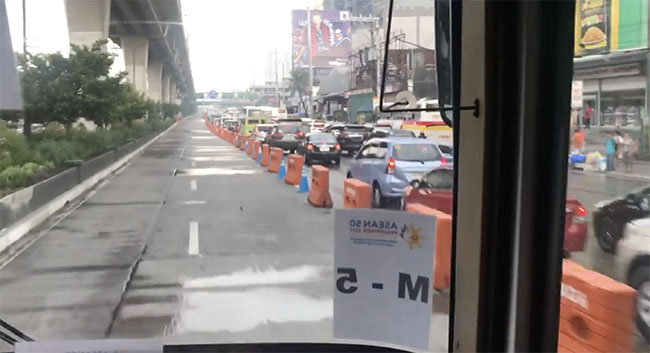FULL TEXT: Amb. Albert del Rosario’s opening remarks in a forum on a code of conduct in the West Philippine Sea
At a recent forum organized by the Stratbase ADR Institute with the theme “ASEAN 2019: Advancing Partnerships in Promoting Peace, Security, Stability, and a Code of Conduct that is Substantive, Effective, and in accordance with the International Law”, Stratbase’s Chair, former Secretary of Foreign Affairs and Philippine Ambassador to the United States, Ambassador Albert Del Rosario, gave the opening remarks. Present also at the forum was retired Supreme Court Justice Antonio T. Carpio, the forum’s keynote speaker.
Both Del Rosario and Carpio were among the major personalities involved in the filing of an arbitration case by the Philippines against China involving territorial disputes in the West Philippine Sea. On July 12, 2016, the Permanent Court of Arbitration at The Hague ruled in favor of the Philippines.
We are publishing Ambassador Del Rosario’s speech in full below.
OPENING REMARKS
Amb. Albert Del Rosario
CHAIR OF STRATBASE ADR INSTITUTEFORMER SECRETARY OF FOREIGN AFFAIRS AND PHIL. AMBASSADOR TO THE US
STRATBASE ADR INSTITUTE FORUM
October 28, 2019ASEAN, by definition, is a regional institution that is based on “shared commitment and collective responsibility in enhancing regional peace, security and prosperity.” It promotes a regional security architecture that is rules-based and a multilateral cooperation for sustainable development, peace and stability in Southeast Asia.
Since its founding, ASEAN has helped its members to surmount the many divisions of our past: the isolation caused by colonialism; the struggle of state-building; and the effects of the Cold War.
As a result of ASEAN’s expansion, we have an umbrella over all in Southeast Asia which is no small feat since many outside observers fail to realize the diversity of ASEAN’s Member States and the fact that it includes several of the fastest growing economies in the world. In these challenging times, where an evolving new regional order is being shaped by the South China Sea dispute, it is indeed imperative to raise the following questions: Where are we and where should we be headed?
First, we need to bring ASEAN citizens to feel a closer kinship and a shared stake in the Association which is an enormous and incomplete task for the diverse socio-cultural community in Southeast Asia. But it has to be done, because our region’s identity will be an anchor for stability that will drive future action.
Second, although ASEAN Member States have so far tamed the most strident aspects of economic nationalism at home, we cannot shield ourselves from the threats to globalization beyond our borders. Globalization may well need fixing, to spread its gains more equitably, but it cannot be discarded without great risk.
For ASEAN at least, globalization has brought net gains. The ASEAN rate of growth and steady development are direct results of opening up to the global economy. As it stands, it is in the ASEAN Economic Community that our region has its brightest prospects.
Third, we must keep our eyes open to the political consequences of our governments’ financial relationships. In our own country, we have shared our concern that there is little to separate our political disagreements with China and any financial relationship. There is no ‘firewall’ that separates the two. By entering into burdensome financial agreements, we may end up not only tying our own hands, but also the hands of the next generation. We cannot trade away our sovereignty or sovereign rights, and we should not give even the impression that we are willing to do so.
Fourth, and most concerning, I believe that ASEAN is adrift. This situation may be explained in part by the importance that we attach to our economic ties with China. China is ASEAN’s second-largest trading partner after trade within ASEAN itself.
I am concerned that this fact has translated into fear—the fear of economic retaliation that stops us from standing up on important issues.
In my humble view, our region needs to define its own leadership. To do otherwise is to cede the initiative to an outside power. To start, the largest states, Indonesia, the Philippines, and Vietnam, should consider offering that leadership and serving as the tip of ASEAN’s spear. On the threat of use of force, as mentioned by our president, war is still unlikely in any reasonable scenario. Professor Amitav Acharya of the American University observes that China’s military action is unlikely as the costs will be too high. Over 60% of its gross domestic product depends on foreign trade, while imported oil accounts for 50% of its oil needs. Acharya has underscored the dependence of China’s commerce on “access to sea lanes through the Indian Ocean, the Malacca Straights and other areas over which it has little control, and which are dominated by US naval power.
An aggressive Chinese denial of South China Sea trade routes to world powers, and the disruption of maritime traffic the resulting conflict might cause, would be immensely self-injurious…”
Chinese Minister Wang Yi himself concurs with this observation. It may not be necessary to shrink to China’s threat of war.
However, the rules-based and peacefully co-existent ASEAN architecture remains at risk, given the evolving geo-political struggle in our region. Absent a binding code of conduct, continued Chinese aggression and military activities will persistently push the existing entitlements under international law of Brunei, Malaysia, Indonesia, the Philippines, Taiwan and Vietnam into more turbulent waters.
In effect, the Hague Ruling on the Philippines’ case in the South China Sea should be an integral part of a binding Code of Conduct. Our region cannot promote the rule of law while ignoring the law as it stands.
The ASEAN should stress that the South China Sea is nobody’s backyard or exclusive preserve. Failure to do so would severely narrow ASEAN’s options and make it over-dependent on a single player. We need to continuously engage external powers—China, the United States, Japan, India, Australia and Europe—in the pursuit of ASEAN’s enduring peace and prosperity.
To do this, we should encourage them to engage each other to reduce mutual suspicion and to contain their rival ambitions in our region. We must discourage them from dividing us; for ASEAN to have centrality, it must have solidarity.
Looking forward, I would like to acknowledge and commend the perceived role that the ASEAN can assume in the upcoming 35th ASEAN Summit in Bangkok from 31 October to 04 November, 2019.
As for Vietnam, I would also like to acknowledge its forthcoming Chairmanship of ASEAN in 2020 and commend the pronouncement of Deputy Prime Minister Pham Binh Minh at the General Debate of the 74th Session of the United Nations General Assembly.
According to him, “Viet Nam endeavors to enhance the cooperation and complementarity between the Council and regional organizations, particularly in conflict prevention and sustainable peace efforts.”
Earlier, we had been asked to share our views on what we believe should be the Philippine strategy regarding a Code of Conduct in the South China Sea (COC), and if the Philippines should work with Vietnam to push China to agree to a code with specifics. Our response is that we had lost track of how many years it has been since we started working towards a COC.
It would appear throughout that China was adopting a delaying strategy in moving the COC forward in order to give itself time to complete its unlawful expansion and militarization strategy in the South China Sea.
Now that China has practically completed its overall strategy, Beijing appears to want to forge ahead with the COC. What could it mean?
To us, it means that we will need to exercise utmost vigilance in ensuring that the COC is not utilized by Beijing for the purpose of undermining the Award in The South China Sea Arbitration, which is now an integral part of international law and with which China is obligated to comply as a State Party to the United Nations Convention on the Law of the Sea (UNCLOS).
Clearly, it would be a constructive move to consult with Vietnam to give us an opportunity to share and appreciate each other’s views which could lead to an agreed plan of action that is beneficial not only to both countries but to others as well.
If our memory serves us correctly, Vietnam had specific positions on banning any new Air Defense Identification Zone (ADIZ), on clarifying maritime entitlements in accordance with international law, on the blocking of China’s proposal to ban military drills in the South China Sea with outside powers unless all signatories agree, and on the blocking of Beijing’s proposal to exclude foreign oil firms by limiting joint development deals to China and South East Asia. The aforementioned are all areas of major importance which should be fully supported not only by the Philippines but by ASEAN as a whole.
An ASEAN consensus on the specifics, if achieved, will serve to demonstrate to the world that the 10 ASEAN states are a solid body that is willing to strongly uphold ASEAN centrality and not allow itself to be bullied and bribed.
Today, I am delighted that we have with us as keynote speaker an inspiring patriot, my friend and partner, Justice Antonio Carpio. A man with honor and dignity, he has been the clear voice that has been cautioning the current administration on its policy on the South China Sea. Justice Carpio has been a vocal supporter of the need for ASEAN to make a united stand against China’s unlawful claims in the South China Sea to protect the entitlements of ASEAN Member States under international law.
With the benefit of foresight, he anticipated in 2011 Beijing’s expansionist agenda to establish de facto control over almost all of the South China Sea. Since then, Justice Carpio has been the staunchest defender of our country’s maritime rights and entitlements under UNCLOS.
He further asserted that circumstances were instructive of the need to bring China to an UNCLOS Tribunal where China’s naval power does not matter. Eventually, the Philippine government listened to his advice.
The result was a resounding Philippine victory as embodied in the Award of The South China Sea Arbitration.
From day one, Justice Carpio’s advocacy was exemplified by rigorous research and a collation of voluminous resources on the South China Sea dispute. These were subsequently submitted to the Tribunal and eventually reinforced the Philippines’ case during the arbitration proceedings. As a result, Justice Carpio is recognized as one of the key architects of The South China Sea Arbitration.
In 2011 as well, Justice Carpio penned the Supreme Court decision in Magallona v. Ermita which upheld the Philippine Baselines Law consistent with UNCLOS. This case served as the precursor to The South China Sea Arbitration in 2013, registering the Philippines as UNCLOS-compliant; and thus established its credibility before the UNCLOS Tribunal.
Beyond the legal parameters, he likewise broadened the reach of the arbitral case. Justice Carpio reached out to the people not only to raise the public’s awareness on the lawfulness of the country’s position in the South China Sea, but also to urge people to fight for what is right. Moreover, the central import of international law, the peaceful resolution of disputes and upholding the rights of all nations, large and small are embodied in his invaluable book entitled “The South China Sea Dispute: Philippine Sovereign Rights and Jurisdiction in the West Philippine Sea.”
It is our earnest hope that with Justice Carpio’s invaluable contributions, coupled with a fine-tuned moral compass and political will, our country will be able to make progress in giving our countrymen what they deserve while pursuing stability and peace in the world.
We fully agree with Justice Carpio in saying that we should not gamble our country’s waters on the uncertain prospects of monetary gain. It is not only us who own these waters but our children and the unborn generations of Filipinos. As enshrined under our Constitution and as a matter of national honor, we Filipinos have a solemn duty to protect and preserve our country’s rights.
We take this opportunity to express once again our respect, our admiration, and our gratitude to Justice Carpio for his patriotism. As well, thank you everyone for the honor of your presence today. We look forward to yet another informative and inspiring session with our most respected geopolitical thought leaders.
###



